British Grand Prix: Lewis Hamilton will remember win until his 'dying day'
- Published
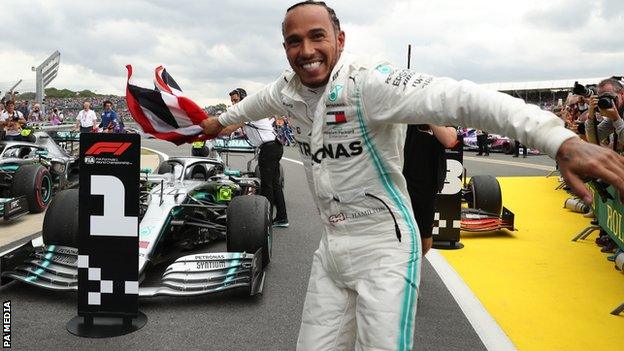
On a day of monumental sporting events, when the British Grand Prix was always going to struggle for attention against the competing attractions of Wimbledon and the Cricket World Cup, Formula 1's leading drivers delivered entertainment every bit as vivid and compelling as that at Lord's or the All England Club.
Lewis Hamilton took a record sixth British Grand Prix victory, with a drive that included a brief but nail-biting scrap with Mercedes team-mate Valtteri Bottas, and then a masterful strategic decision made by Hamilton that won him the race.
Behind him, Sebastian Vettel had another day to forget, with another mistake in a racing situation to add to the long list that trails back to last year's German Grand Prix.
And his Ferrari team-mate Charles Leclerc and Red Bull's Max Verstappen staged a man-to-man duel for nearly half the race that will go down in history as one of the greatest pieces of racing the sport has ever seen.
Hamilton didn't need the safety car
After the race, a cursory assessment of events might conclude that Hamilton won the race because the safety car period caused by Alfa Romeo's Antonio Giovinazzi on lap 20 gave him a 'free' pit stop that put him ahead of Bottas. But that would be wrong.
In fact, by the time Giovinazzi went off, Hamilton was already in a very strong position.
Hamilton started the race like a scalded cat, immediately putting intense pressure on Bottas for the lead. They battled hard through the first lap, Bottas defending hard but fair to retain first place. Hamilton backed off a little and then came back hard into lap four.
He tried the outside at the Brooklands left-hander, then cut back early to take the outside for the following 180-degree right at Luffield. Hamilton came out ahead, and looked to have completed a brilliant move for the lead, only for Bottas to come back at him, go for the inside and re-pass into the high-speed Copse corner at the end of the old pit straight.
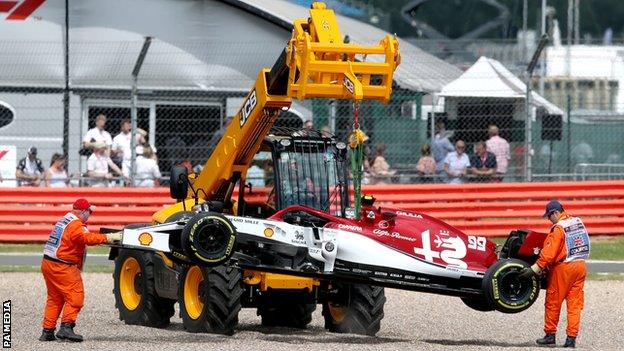
Giovinazzi took a spin off the track at Vale, meaning Hamilton and Mercedes' hopes for a safety car appearance were granted
"He was on the inside," Hamilton said, "but when we pulled out of the corner I couldn't really see where he was. He was in my blind spot. He wasn't in my mirror but I couldn't see him next to me either, so I couldn't close the door, just in case he was there and he happens to be there obviously.
"He drove sensationally well there. So I was, 'OK, I've got to back off, wait until he stops and then nail it after that'."
What Hamilton did next was going to win him the race, safety car or no safety car. He had already decided before the grand prix started that he was going to try to go for a one-stop, knowing Bottas was doing two.
That meant looking after his tyres and extending his first stint as long as possible. Hamilton did this superbly, keeping his tyres in much better condition than Bottas could.
When Bottas re-emerged from his pit stop on lap 16, he was only slightly faster than Hamilton. That meant that when Hamilton did stop - which would have been more or less at the time the safety car came out anyway - he would have rejoined only a second or two behind his team-mate. With Bottas still needing to stop again, that was effectively game over.
"I could have just sat behind him, if I'd wanted to (and waited for him to stop again)," Hamilton said.
Bottas would have rejoined from his second pit stop some way behind Hamilton. He would have had fresher tyres, but the fact Hamilton was able to do fastest lap at the end of the race on hard tyres with 32 laps on them, beating a time Bottas had just set on the softs, rather suggests his team-mate would not have caught him.
In short, the safety car made it easier for Hamilton, but he was going to win the race anyway.
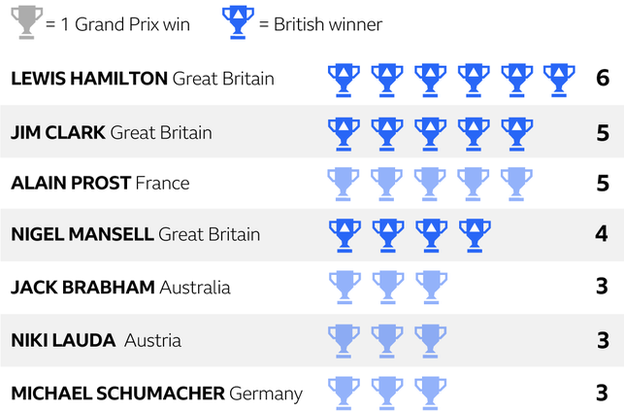
Hamilton's sixth British GP win, surpassing the previous record he shared with Jim Clark and Alain Prost, meant a lot to him.
Winning his home race, he said, is "the greatest single moment of any athlete in the world - to raise their flag as the number one or with the gold or whatever it may be in their home country.
"It's one of the single most incredible feelings and special moments an athlete can have. I come here and I've got this incredible support. They always talk about how much it lifts you up and it's a huge amount of energy but a lot of weight comes with that, a lot of responsibility. So I just really, really wanted to deliver."
On the slowing down lap, he pulled over and picked up a Union flag from a marshal.
"When you achieve something like that and you see all those British flags, I was looking the whole time for a flag - 'someone give me a flag' - because one day I'm going to be able to look back and I'll have that picture of me in the car with that flag and I'll always be able to smile until my dying day."
More questions over Vettel
Vettel started the British Grand Prix weekend with an interview with BBC Sport in which he was unusually candid about the number of mistakes he has been making in the past year.
So it was ironic that his weekend ended with another - when he misjudged a passing move on Verstappen and rammed into the back of the Dutchman's Red Bull at Vale.
That makes it seven races in which Vettel has made an error in the year since he won in dominant fashion at Silverstone in 2018. It's a record that would be worrying for any F1 driver, let alone a four-time world champion.
Vettel admitted his error and afterwards was asked to sum up in one word his feelings about his season so far.
"Difficult," he said.
These are troubling times for one of the great names of the sport. But Hamilton, at least, had some words of encouragement for him.
"I absolutely believe he will rebound," Hamilton said in his post-race news conference, as Federer-Djokovic played on the screens behind him. "You look at the greats playing tennis - he is one of those. He had a difficult race today but he's a four-time world champion and he will come back stronger in the next race."
You saw it, but you still couldn't believe it
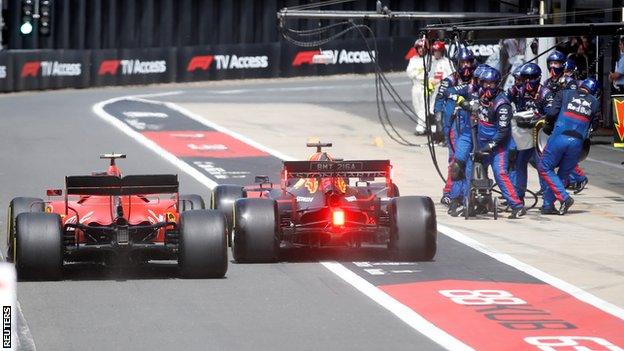
The pit crews had the best seat in the house for Leclerc and Verstappen's pit-lane showdown
It was doubly bad for Vettel that he had a race like this after a qualifying session in which he was a massive 0.6secs slower than team-mate Leclerc.
Worse, while Vettel made yet another error in close combat, Leclerc displayed on Sunday race-craft of the highest quality in a battle with Verstappen that ran for 20 thrilling, nail-biting, breathless laps.
Leclerc's Ferrari was no match for Verstappen's Red Bull on pace, but he kept back F1's most aggressive driver with consummate judgement and exquisite timing in a battle that will surely go down in history as one of the greatest of all time.
The race was replayed over and over again on the media centre screens afterwards and no matter how many times you watch it, it's still almost unbelievable how Leclerc keeps Verstappen behind.
Watching them go at it hammer and tongs for lap after lap, it brought back memories of the last three laps of the 1979 French Grand Prix, when Gilles Villeneuve and Rene Arnoux had a scrap that is often held up as wheel-to-wheel racing at its finest.
Another that springs to mind was Hamilton's defence from Mercedes team-mate Nico Rosberg on his way to victory in Bahrain in 2014.
The skill on display from both defender and attacker at Silverstone on Sunday was every bit as remarkable.
Time and again, Verstappen looked sure to pass, only for Leclerc to find a way to hold him back in the most awe-inspiring way.
There were a number of highlights, including when Leclerc dived inside Verstappen into Club and forced him all the way to the outside of the track into the run-off at Vale. When they stopped together, Verstappen's crew got him out just ahead and he looked finally to have won the place, only for Leclerc to pressure him through Turns Three and Four, Verstappen to run wide, and Leclerc to get back past again.
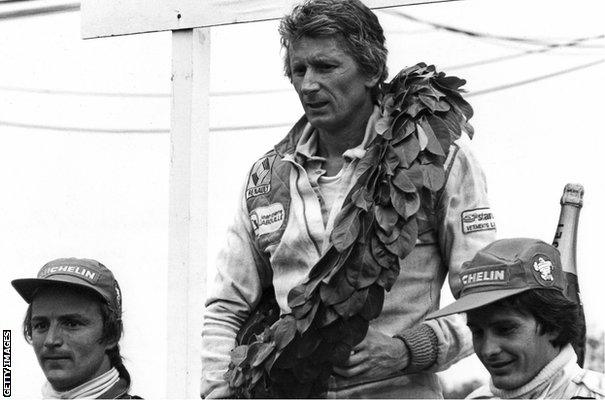
1979 saw one of the most famous battles in motorsport history - Ferrari's Gilles Villeneuve (right) v Renault's Rene Arnoux (left) at the French Grand Prix
But one moment in particular stands out. Up Hangar Straight on lap 19, Verstappen went for the inside and was clearly ahead as he entered Stowe corner. Leclerc, initially defending towards the inside, flicked back to the outside, braked later than Verstappen could on his shallow line, and somehow shot back past him on the outside. When you first see it, you can't believe it has happened.
It was brutally brilliant stuff, hard racing, but just on the line between fair and dirty. It was one of the greatest spectacles F1 has put on for some time. And it would not have been possible had Verstappen not got away with pushing Leclerc off the track when passing for the lead in Austria two weeks ago.
That day taught Leclerc a lesson that he handed back to Verstappen with knobs on at Silverstone.
"That was definitely the most fun I've ever had in my Formula 1 career," Leclerc said. "Well, it's a short career, only one year and a half, but it was definitely very, very fun from inside the car.
"Austria was quite an eye-opener for me to understand how far we could go and what was accepted and I'm very happy at the end to race like this. I think every driver wants to race hard and that's what we did during most of the race. It was very, very fun, always borderline, but I think always in the rules and very, very enjoyable from the car."
It looked personal - as if he was out for revenge, saying to Verstappen, anything you can do, I can do better. But Leclerc said no, that wasn't the case.
"Nothing personal," he said. "After Austria, I think if the stewards accept us to race that way, then I am more than happy to race like this and that is what I did this weekend.
"Nothing special. I just raced harder than normal just because I feel like in the last two races or maybe a bit before I felt like Formula 1 wants hard racing.
"We are pushing as drivers. That's where we enjoy the most, to be racing like that, and that's what I did."
